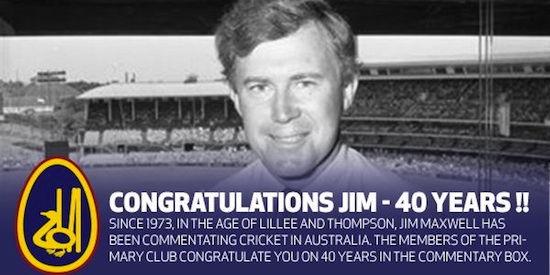ABC cricket commentator Jim Maxwell talks to Steve Ahern about his stroke and why radio cricket is still booming
Jim had a stroke three years ago that took him off air for a season, but he is now back in the ABC commentary box, as he has been since 1973.
“Physically I’m a bit mucked up, but you just get on with it,” he told radioinfo, sitting at the front of the Members Stand before the third day of play between Australia and New Zealand in the Pink Test. Jim’s right arm and leg show signs of his stroke, but he says it has not affected his commentary. “In fact it’s probably made me a bit quicker and a bit more loose.”
“One in six Australians get strokes, that should be a bit more recognised… You develop a sense of your mortality when you face something like this,” I’m still perpendicular, he said with characteristic self deprecation.
One example of being “a bit more loose” was a “rant” (Jim’s word) that he had on air the other day about basketball.
“It’s one of my pet hates… It’s great that people play sport, whatever that may be, but I have this thing about basketball from my time at school… I thought parents just got their kids into basketball so they could spend one hour with them at sport on Saturday, then go and do what they wanted to do… cricket is more of a commitment, my father always came to watch me and I spent that time to watch my kids… [You have to be] outdoors in this country.”
At a time when you can get cricket scores on your phone, is cricket on the radio still important?
“I think it’s very important… it provides a link for people to something that is very much part of the Australian culture. People on tractors, driving across the Nullabor don’t have the ability to sit down and watch it, but they can listen to it. Audio is important.
“Radio is a unique medium, it has a certain intimacy. Audio is a very powerful medium which has more relevance now than it ever has on whatever device you listen to it on.”
What are Jim’s secrets for painting pictures and creating great audio sports commentary?
“Use the language well, using a range of different words… call it was you see it.
“To do commentary well you have to have done it for some time… if you don’t have the confidence to be live and sometimes put your foot in your mouth, then you’re not having a go… it’s live radio.
“Unlike fast moving sports such as football, cricket is a it easier on the brain, you don’t have to have that rapid fire identification technique you can spend more time to be a bit more relaxed… time for reflection and taking the audience to other places.”


